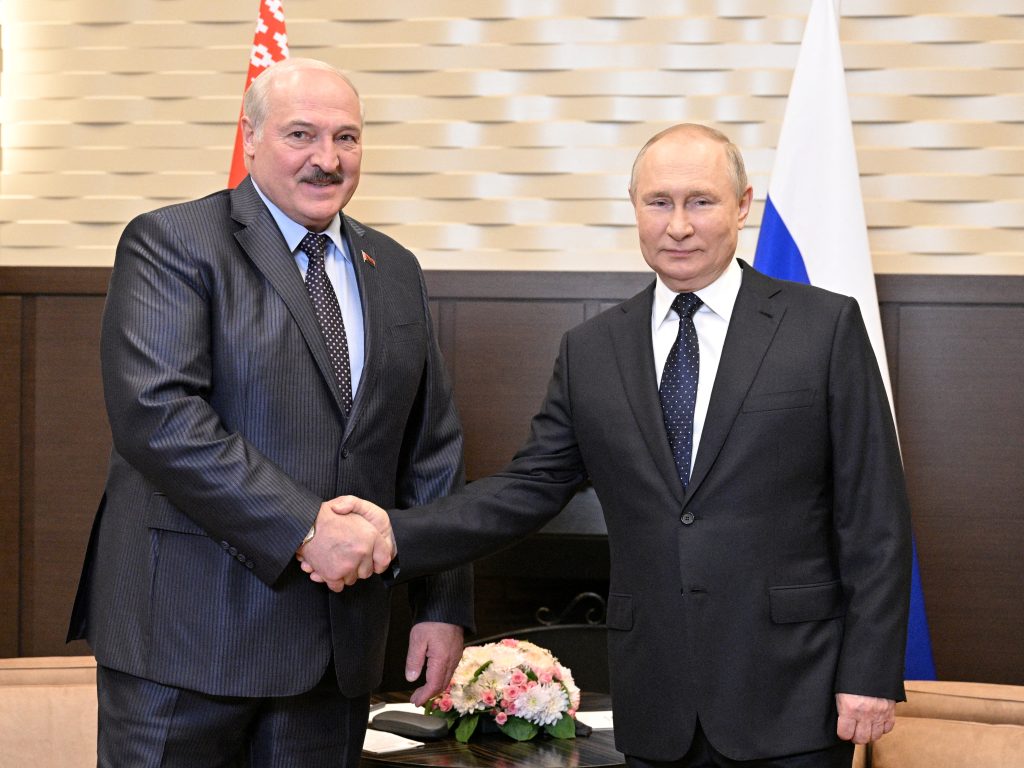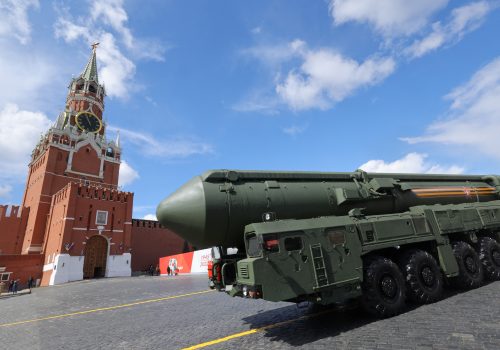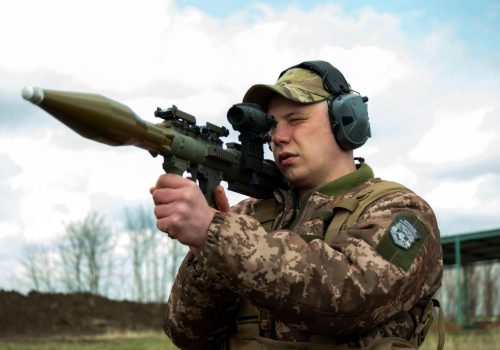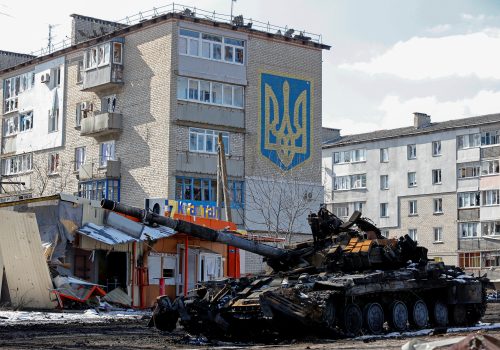Vladimir Putin will travel next week to one of the only countries in Europe where he is still welcome in order to meet with one of his few remaining international allies.
Russian media reported that Putin will visit the western Belarusian city of Hrodna on June 30 to attend the Union State Regions Forum with Alyaksandr Lukashenka. Both the symbolism and timing of the trip are significant and revealing.
First the symbolism. Putin’s trip to Belarus will be his first in three years. In contrast, Lukashenka has made numerous trips to Russia, visiting Sochi, St. Petersburg, Moscow, and even a cosmodrome in the Russian Far East, in order to show his fealty to the Kremlin leader. This asymmetry reflects the true balance of power within the Putin-Lukashenka axis of autocrats.
The fact that Putin will now travel to a provincial Belarusian city to meet Lukashenka does not necessarily suggest a change in power dynamics between the two dictators. But it does indicate that with his troops bogged down in Ukraine’s Donbas region, his international isolation increasing, and his conflict with the West intensifying, Putin needs Lukashenka more than he would probably care to admit.
In terms of symbolism and timing, Putin’s visit will also come as the European Union is moving quickly to grant EU candidacy status to Ukraine and Moldova. The EU is scheduled to vote on candidacy status for the two countries at the 27-nation bloc’s summit on June 23-24, in what Ukrainian President Volodymyr Zelenskyy has called a “historic week” for his country.
The juxtaposition of Ukraine and Moldova triumphantly achieving their long-coveted goal of EU candidacy with the image of two aging, ailing and isolated dictators meeting at a meaningless conference in Belarus provides an apt split-screen moment that illustrates the growing gap between democratic Europe and the continent’s autocratic outliers in Moscow and Minsk.
It also illustrates Lukashenka’s utter lack of legitimacy as his country’s ruler. As Lukashenka grovels before his only patron, himself an international pariah, Belarusian opposition leader Sviatlana Tsikhanouskaya is justifiably being treated in Western capitals like an honored head of state. She addressed the Kalinowski Conference at the European Parliament in Brussels on June 21, a meeting also attended by prominent members of the Belarusian opposition. The group was established by European lawmakers as a forum to advance the cause of a democratic Belarus.
As I have previously written in this space, the United States and its allies should get ahead of the curve and recognize Tsikhanouskaya’s government in exile as the legitimate government of Belarus.
Eurasia Center events

Putin’s trip to Belarus will coincide with the NATO Summit in Madrid, which Zelensky will address via video link. The summit, the alliance’s first since Russia’s full-scale invasion of Ukraine, will be historic for several reasons, not least of which are the membership applications of Sweden and Finland. It will also come at a time when Moscow is threatening NATO member Lithuania over Vilnius’s enforcement of EU sanctions by blocking the transit of some goods to Russia’s exclave of Kaliningrad.
This is yet another juxtaposition and split-screen moment that does not favor the Putin-Lukashenka axis of autocrats. We can likely expect the 30-member Western alliance to demonstrate unity and resolve in Madrid. The alliance will almost certainly stand behind Lithuania which, after all, is only enforcing sanctions that have already been enacted by the EU. And despite Turkey’s concerns, we can also ultimately expect unity over Finland and Sweden’s membership applications.
Whatever photo ops, announcements, or declarations come out of the Putin-Lukashenka meeting in Hrodna, they will appear weak compared to the Western unity and resolve that is likely to be on display in Madrid.
The contours of the new Europe are coming into focus. The EU is set to grant Ukraine and Moldova candidacy. The European Parliament is demonstrating its strong support for democratic change in Belarus. Tsikhanouskaya is being treated like the legitimate head of state she may soon become. And NATO is poised for an historic enlargement in response to Russia’s illegal war of aggression against Ukraine. Meanwhile, two washed-up dictators are planning to meet at a meaningless conference in Hrodna.
Brian Whitmore is a nonresident senior fellow at the Atlantic Council’s Eurasia Center, an Assistant Professor of Practice at the University of Texas at Arlington, and host of The Power Vertical Podcast.
Further reading
The views expressed in UkraineAlert are solely those of the authors and do not necessarily reflect the views of the Atlantic Council, its staff, or its supporters.

The Eurasia Center’s mission is to enhance transatlantic cooperation in promoting stability, democratic values and prosperity in Eurasia, from Eastern Europe and Turkey in the West to the Caucasus, Russia and Central Asia in the East.
Follow us on social media
and support our work
Image: Russian President Vladimir Putin shakes hands with his Belarusian counterpart Alyaksandr Lukashenka during a meeting in Sochi. May 23, 2022. (Sputnik/Ramil Sitdikov/Kremlin via REUTERS)




